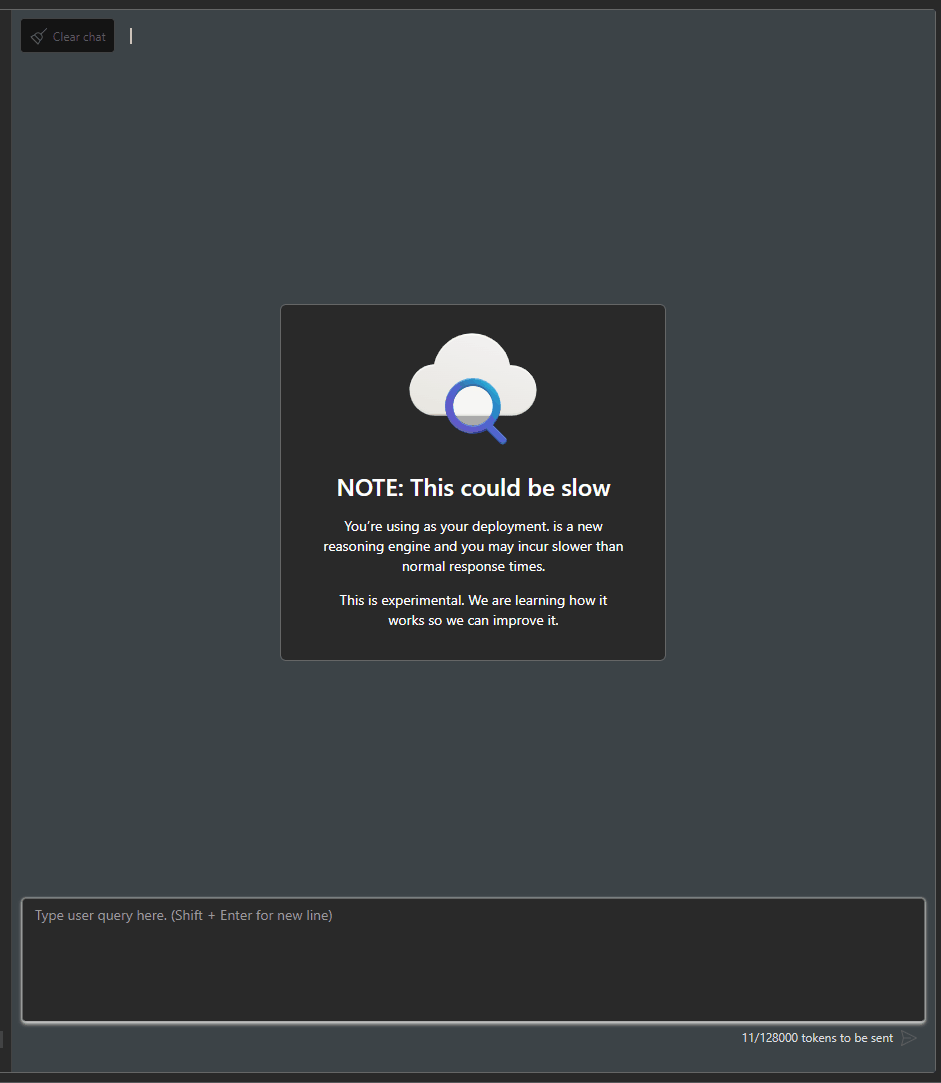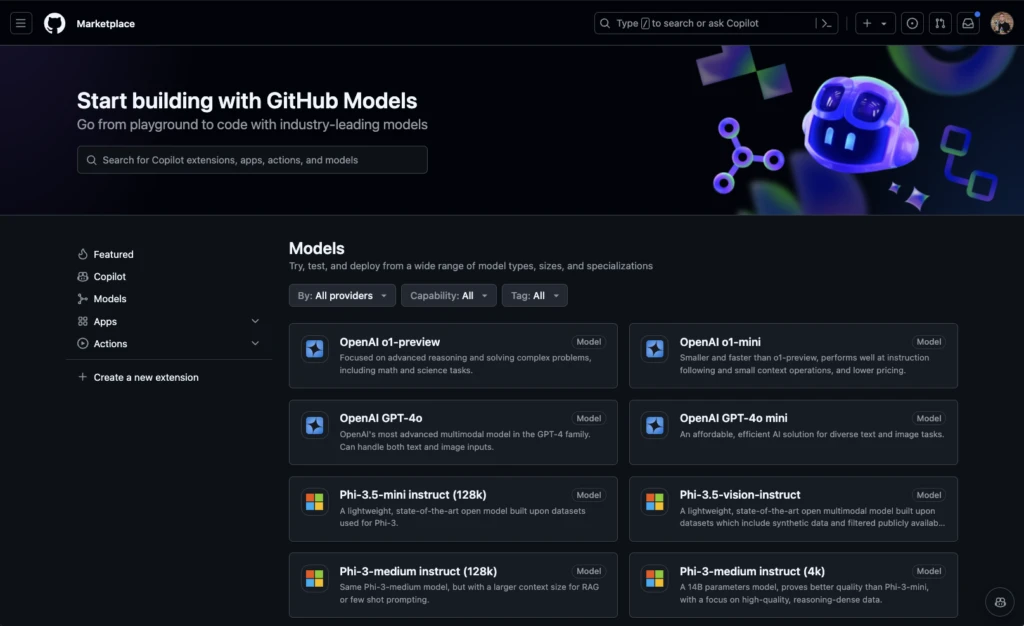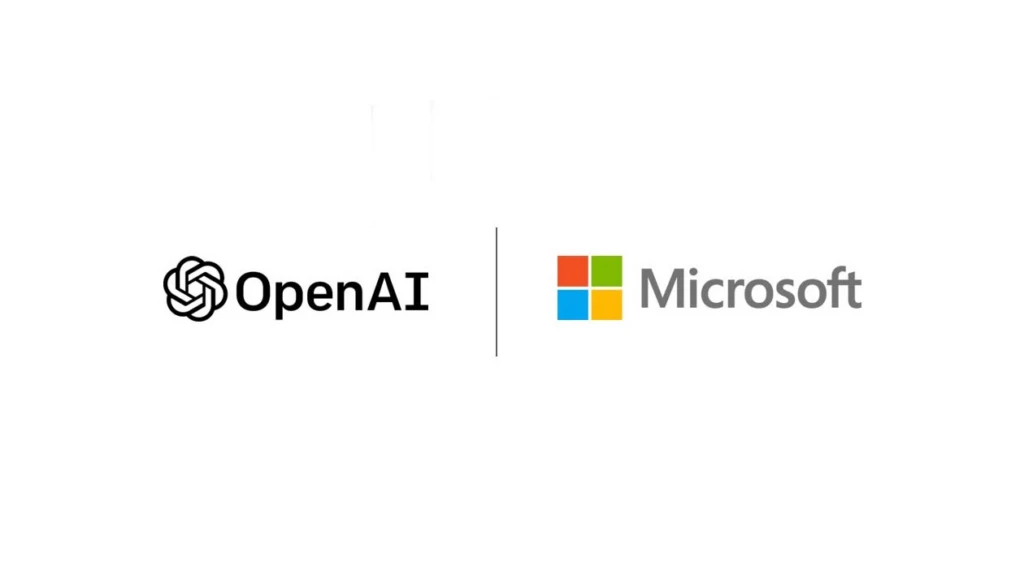We are excited to add OpenAI’s newest models o1-preview and o1-mini to Microsoft Azure OpenAI Service, Azure AI Studio, and GitHub Models. The o1 series enables complex coding, math reasoning, brainstorming, and comparative analysis capabilities, setting a new benchmark for AI-powered solutions.
Azure OpenAI Service
Build custom generative AI appsThe o1-preview and o1-mini models are now accessible in Azure AI Studio and GitHub Models to a select group of Azure customers to collaboratively explore and identify the unique strengths of each model. The o1 series of advanced reasoning models excel at complex and nuanced problem spaces like these:
- Complex code generation: Capable of algorithm generation and advanced coding tasks to help developers.
- Advanced problem solving: Perfect for comprehensive brainstorming sessions and tackling multifaceted issues.
- Complex document comparison: Ideal for analyzing contracts, case files, or legal documents to discern subtle differences.
- Instruction following and workflow management: Particularly adept at handling workflows that require shorter context.
Early adopters share their insights
Our early adopters have already shared valuable insights and are excited to use these models to advance the capabilities of their applications.
GitHub Copilot, the world’s most widely adopted AI developer tool, has been testing the o1 models, showing promising results in code analysis and optimization.
“With o1 and its strong reasoning capabilities allows, GitHub Copilot will enable developers to build for the bigger picture, faster. Nothing beats the feeling when you solve a coding problem within minutes instead of hours. And through GitHub Models, we can’t wait to see what developers do with o1 in their apps.”—Thomas Dohmke, CEO, GitHub.
Harvey, a leader in generative AI for professional services, is inspiring customers by integrating its platform with Azure OpenAI Service, now available in Azure Marketplace.
“In our testing, we believe o1 marks a step change in legal reasoning and will enable us to create custom solutions that tackle more ambitious workflows like SPA and S-1 drafting or agents that assist in critical aspects of due diligence and e-discovery. This marks a transition from chatbots to collaborative platforms that allow professionals to work hand-in-hand with AI on complex use cases.”—Winston Weinberg, co-founder and CEO of Harvey.
Cognition, an applied AI lab building end-to-end software agents, is excited to integrate the new models into Devin, the world’s first fully autonomous AI software engineer.
“o1 is a significant advancement in reasoning models, and we’re excited for how innovations like this will improve Devin, allowing it to solve ever-more complex coding tasks.”—Scott Wu, CEO of Cognition.
These examples highlight just a few of the ways the o1 series of models can bring advanced reasoning and analytical capabilities to your projects.
New updates in our commitment to responsible AI and Safety by default
Safety continues to be our top priority in delivering new generative AI models, o1 and o1-mini models in Azure OpenAI Service have “on-by-default” Content Safety features, at no additional cost for you.
OpenAI has invested in additional safety advancements with these models, including new methods that help the model refuse unsafe requests. This makes the o1 series of models among the most robust models we have deployed to date. You can assess the safety of their AI application and model deployments with Azure AI Studio safety evaluations.
With our joint efforts with OpenAI to make the models safer, we continue to expand and improve the Content Safety systems for all models. We’re pleased to announce that Prompt Shields and Protected Materials for Text are now generally available in Azure OpenAI Service. These features help customers maintain the safety and integrity of their generative AI deployments, preventing potential misuse. Finally, we’ve introduced “Spotlighting,” a family of techniques designed to help models distinguish between valid instructions and potentially untrusted external inputs. We’ve updated our documentation explaining how to use “Spotlighting” and related techniques so customers can take advantage of Microsoft’s latest research.
Trying the new models in Azure AI Studio and GitHub
We’re excited to offer a preview of the o1-preview and o1-mini models in Azure AI Studio playground and GitHub Models, available to select customers. This exclusive access enables early experimentation with their advanced reasoning capabilities, with API access coming soon. To get started, visit the Azure AI Studio model catalog and apply for access today.


Navigating our model lineup
GPT-4o models have industry leading capabilities in text and image comprehension and GPT-4o mini offers high quality summarization and Q&A, with cost-effective deployment options and quick response times. At the same time, we have seen the limitations of these models when it comes to solving even simple math problems with strong guidance and examples of how to solve them.
To better understand o1-preview and o1-mini’s place in our model lineup, here’s a quick overview of the key models powering Azure OpenAI Service:
- o1-preview: Focused on advanced reasoning and solving complex problems, including math and science tasks. Ideal for applications that require deep contextual understanding and agentic workflows.
- o1-mini: Smaller and faster, and 80% cheaper than o1-preview, performs well at code generation and small context operations.
- GPT-4o: A versatile, multimodal model that excels in both text and image processing, with superior performance in non-English languages and vision tasks. Suitable for applications needing enhanced accuracy and multilingual capabilities. The model also features JSON Structured Outputs for consistent, well-defined data formats, reducing post-processing needs and improving application efficiency. Designed for real-time applications that require fast, reliable text responses at minimal cost.
- GPT-4o Mini: A smaller, cost-effective version of GPT-4o, optimized for environments with limited resources or high cost constraints. Retains text and image processing capabilities, making it ideal for lightweight applications.
- DALL-E: Generates images from text prompts with safety, ideal for creative content and marketing.
- Whisper: Transcribes and translates speech to text, suitable for real-time transcription and multilingual communication.
These models represent a progression of capabilities, from efficient text processing to advanced reasoning and multimodal functionality. Each model has paved the way for the innovations we continue to introduce with “o1.”
Innovating at scale with Azure
The latest OpenAI models are backed with all the capabilities of the Azure platform, including enterprise-grade security, flexible deployment options, and broad regional availability, which helps customers meet data residency and compliance needs. We have over 60,000 Azure AI customers with exciting production use cases across industries.
Join us in shaping the future of AI
We are excited to invite a select group of customers to explore o1-preview and o1-mini in Azure AI Studio playground and experience its unique capabilities firsthand, by visiting the model catalog and applying for access. But don’t worry if you’re not part of the initial group—our upcoming API release will make o1 series models more broadly available.
We believe in the power of collaboration and innovation, and we want everyone to have the opportunity to benefit from these cutting-edge advancements in AI. Whether you’re new to Azure AI or a seasoned user, there’s never been a better time to experiment, innovate, and grow with us. We look forward to welcoming a wider audience soon and working together to shape the future of AI.

